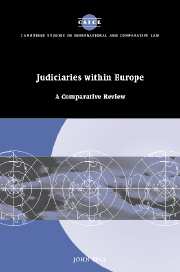Book contents
- Frontmatter
- Contents
- Preface
- List of abbreviations
- 1 Introduction
- 2 The French judiciary
- 3 The German judiciary
- 4 The Spanish judiciary
- 5 The Swedish judiciary
- 6 The English judiciary in comparative perspective
- 7 Factors shaping the character of the judiciary
- Index
- CAMBRIDGE STUDIES IN INTERNATIONAL AND COMPARATIVE LAW
6 - The English judiciary in comparative perspective
Published online by Cambridge University Press: 21 July 2009
- Frontmatter
- Contents
- Preface
- List of abbreviations
- 1 Introduction
- 2 The French judiciary
- 3 The German judiciary
- 4 The Spanish judiciary
- 5 The Swedish judiciary
- 6 The English judiciary in comparative perspective
- 7 Factors shaping the character of the judiciary
- Index
- CAMBRIDGE STUDIES IN INTERNATIONAL AND COMPARATIVE LAW
Summary
Introduction: can continental Europe offer any useful lessons?
Despite the current willingness to refer to European standards, there are traditionally some concerns about using European systems as a useful reference point for the English judiciary. An obvious objection to European experiences might be that their judges are typically recruited immediately after university study and have a career. This is less an objection than it might seem at first. To begin with, we have seen that not all continental judges are recruited straight from university. Many are recruited laterally at a later stage in their professional lives. But, more importantly, as Stevens noted in 1993, over the past thirty years the English system has been gradually developing a career. If we look at the way the path to the Bench is now shaped, England has embarked down the road of a career judiciary. Being a recorder is a typical prerequisite to the Circuit or High Court Bench. Being a deputy district judge is a path to the District Bench, which may lead to the Circuit Bench. From the period of starting as a recorder to retirement, a typical judge may spend twenty-five years of their professional career involved in judicial work, moving from post to post and often gaining promotion. Being a judge is not an end of career position, but a career in its own right. So the ideas of judging as a job and of career management are increasingly important features.
- Type
- Chapter
- Information
- Judiciaries within EuropeA Comparative Review, pp. 298 - 349Publisher: Cambridge University PressPrint publication year: 2006

